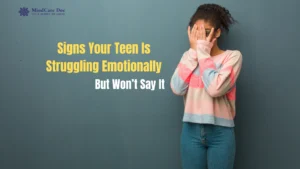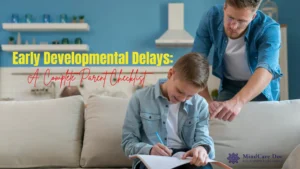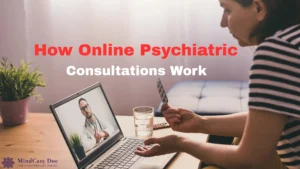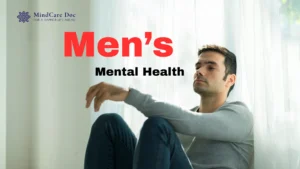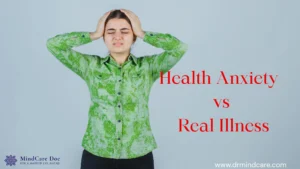
Introduction
You notice your teen spending more time alone, their grades slipping, and a constant cloud of
moodiness. Is this just typical growing pains, or a sign your teen needs therapy?
For many parents, it’s hard to tell what’s “normal teenage behavior” versus a sign of a deeper
mental health challenge. With teenage mental health concerns on the rise, knowing the signs
your teen needs therapy can make all the difference. This article will guide you through
recognizing warning signs, opening healthy communication, and exploring effective counseling
for teens options.
Why Teen Mental Health Matters
Rising Challenges for Today’s Teens
The teenage years bring rapid changes — physically, emotionally, and socially.
Academic pressure, peer relationships, social media comparisons, and uncertainty about the
future can significantly affect teenage mental health. Studies show alarming increases in teen
anxiety, depression, and stress worldwide, making therapy for teenagers more important than
ever.
Why Early Intervention is Critical
Ignoring early warning signs can lead to long – term struggles in academics, self-esteem, and
relationships.
Teen counseling services provide coping strategies that can prevent small problems from
becoming life-altering crises. Early teen anxiety therapy or depression support boosts resilience
and helps teens develop healthy emotional habits for life.
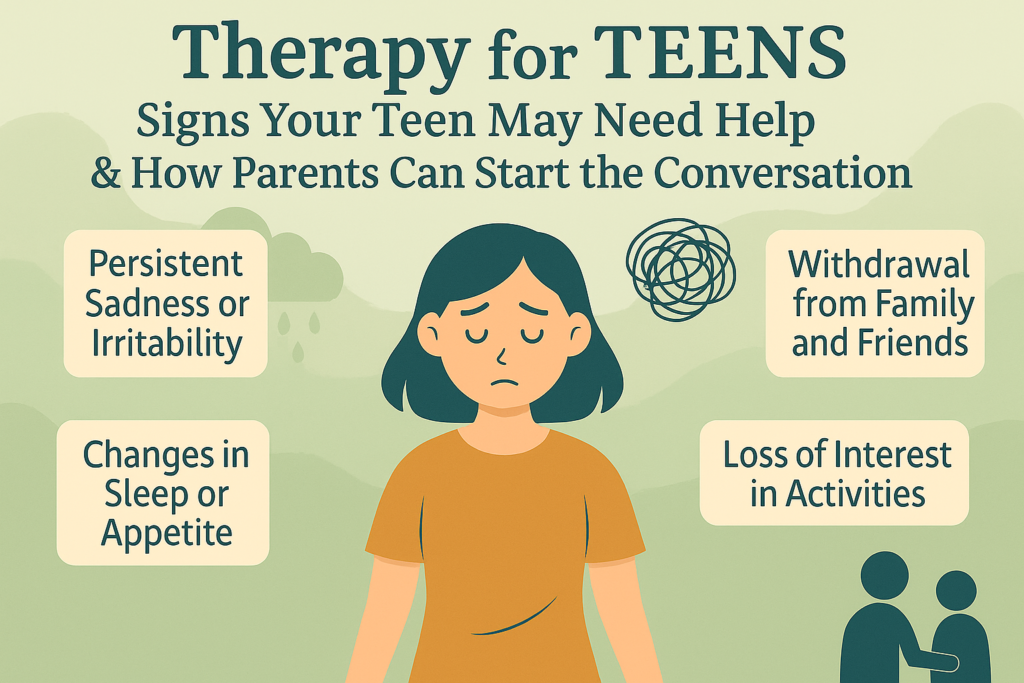
Signs Your Teen May Benefit from Therapy
Persistent Changes in Mood
Sadness, irritability, anger, or emotional numbness lasting for more than two weeks.
Withdrawal from Friends and Activities
Losing interest in hobbies, avoiding family time, or pulling away from peers.
Academic Decline
Falling grades, lack of motivation, or trouble concentrating can be signs your teen needs therapy.
Changes in Sleep or Appetite
Sleeping too much or too little, eating significantly more or less than usual.
Risk-Taking Behaviors
Substance experimentation, reckless driving, or self-harm
Expressions of Hopelessness or Death
Comments about worthlessness, feeling life has no meaning, or thoughts of death.
Unexplained Physical Complaints
Recurring headaches, stomach aches, or fatigue without a medical explanation – often a sign of
stress or depression.
How to Talk to Your Teen About Therapy
Choose the Right Time and Place
Avoid confrontations; instead, pick a quiet, safe moment for discussion.
Lead with Empathy, Not Judgment
Approach the conversation with compassion, not criticism.
Use “I” Statements to Express Concern
For example: “I’ve noticed you seem withdrawn lately, and I’m concerned.”
Listen and Validate Their Feelings
Allow them to speak without interruption; don’t rush to fix everything.
Normalize the Idea of Therapy
Explain that just like visiting a doctor for physical health, counseling for teens is for mental
wellbeing.
Offer Choices and Respect Autonomy
Let your teen choose the type of therapy — in- person or online therapy for teens, therapist
gender, or whether you attend the first session.
Address Common Teen Concerns About Therapy
Reassure them about confidentiality and what sessions look like, and emphasize that therapy for
teenagers is not a punishment.
What Therapy for Teens Looks Like
Common Types of Teen Therapy
● Cognitive Behavioral Therapy (CBT) to manage thoughts and behaviors.
● Family counseling for teens to improve communication.
● Art or play therapy for creative emotional expression.
How Sessions Are Structured for Adolescents
Initial assessment, goal-setting, skill-building, and progress tracking.
The Role of Parents in the Process
Offer support while respecting your teen’s privacy.
Understanding Confidentiality in Teen Therapy
Most conversations remain private unless there’s a safety concern.
When to Seek Immediate Help
Recognizing Crisis-Level Red Flags
Threats of self-harm, suicidal thoughts, or dangerous behavior require urgent attention.
Emergency Resources and Hotlines
Provide suicide prevention hotlines, crisis text lines, and local emergency numbers.
How MindcareDoc Supports Teens and Families
At Dr. Mind Care, we specialize in therapy for teenagers using personalized treatment plans
based on evidence-based approaches. Our compassionate therapists are trained in teenage
depression help, anxiety support, and teen counseling services — both in- person and via online
therapy for teens for privacy and convenience
Wrapping It Up
Spotting early teen mental health signs and starting the conversation is the first step toward
healing. Remember – seeking help is not weakness, but a sign of strength and care.


